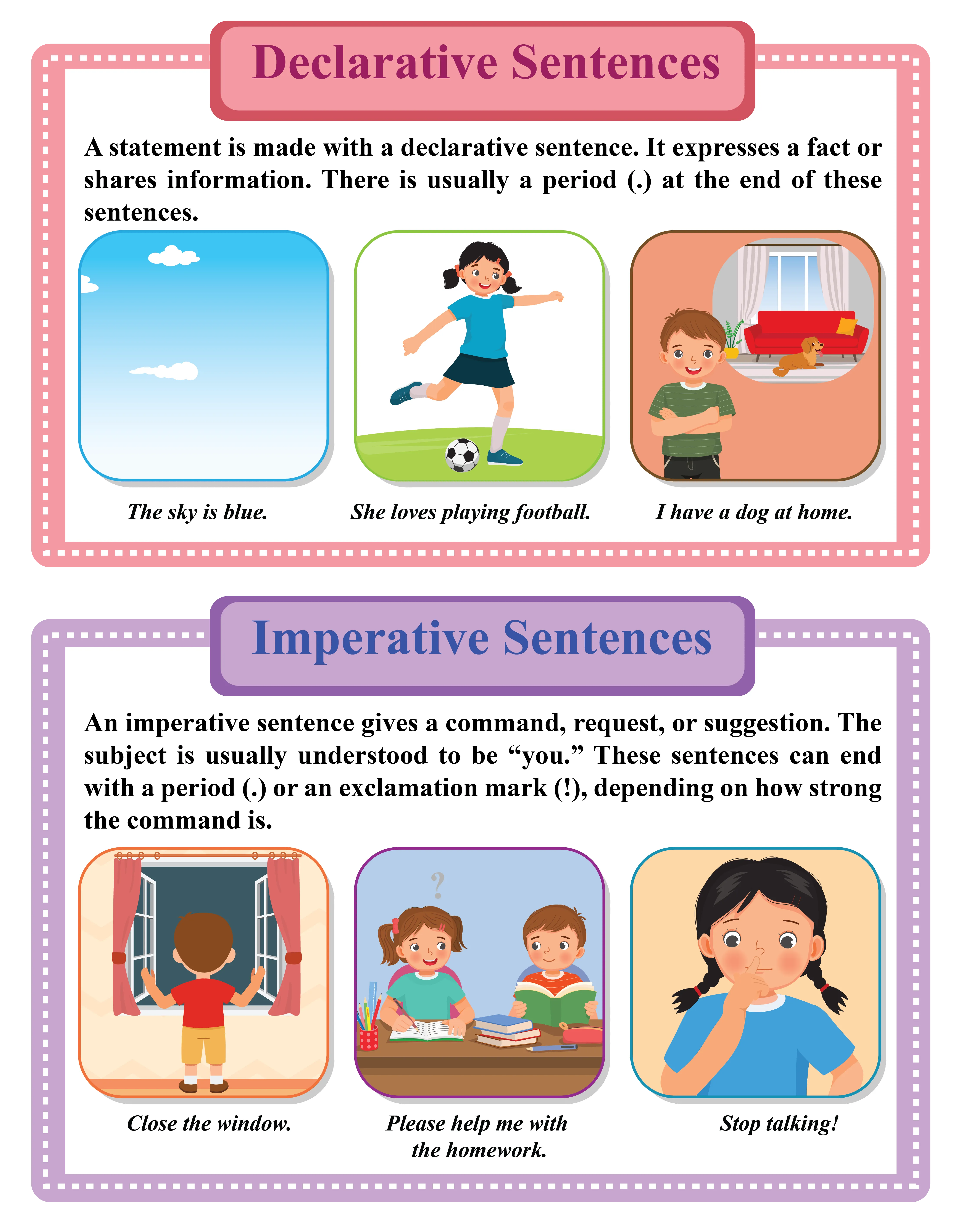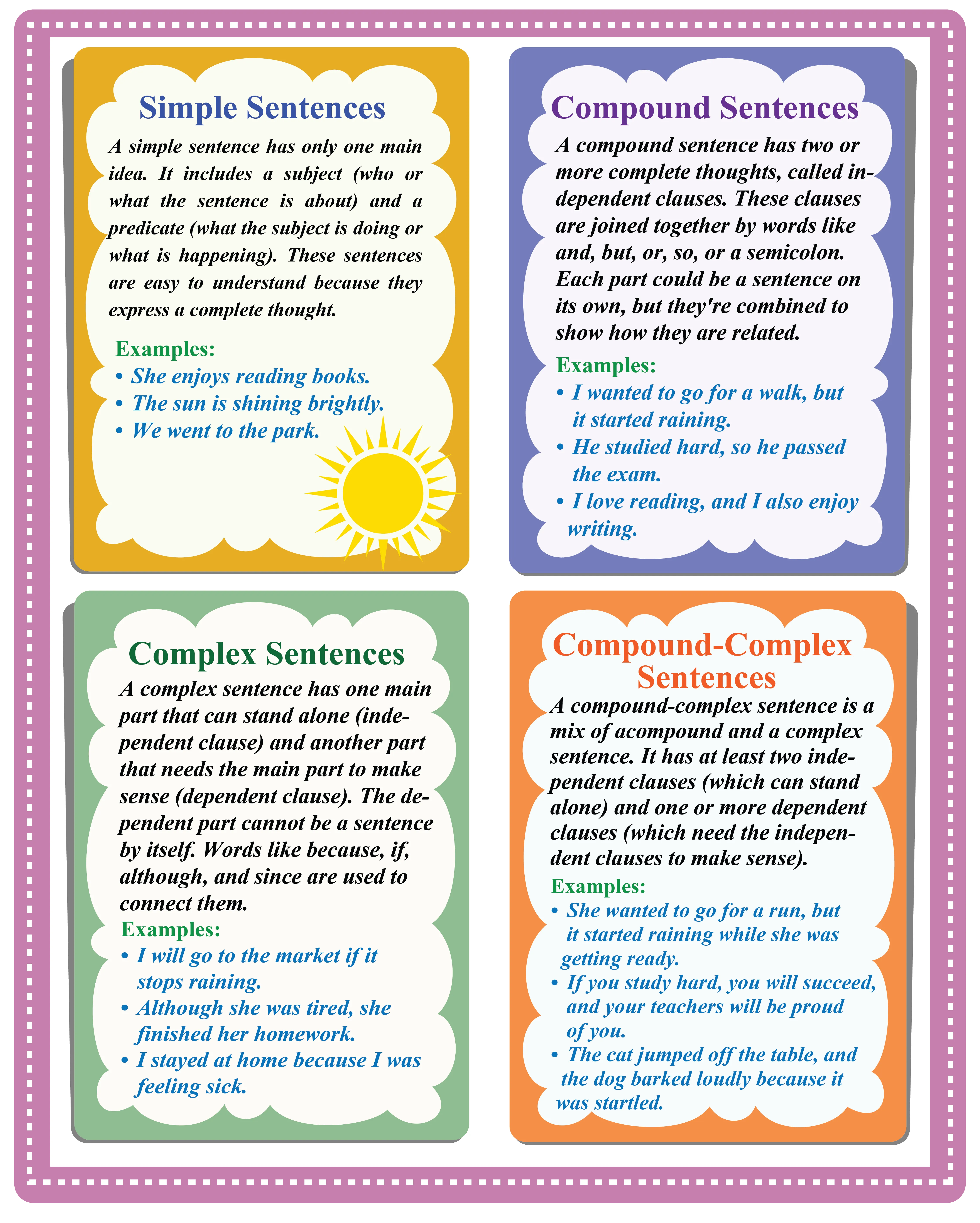
Types of Sentences with Examples: While speaking or writing, we use sentences to express our thoughts and ideas. But do you know that there are different ways you can use sentences? Understanding types of sentences helps make your communication clear and impactful.
It is important to use different types of sentences in English to make any conversation lively and interesting. And for that, you should know how many types of sentences there are in English.
Therefore, for your better understanding, let's learn about the types of sentences with examples and know how they can help in communicating or writing efficiently.
Types of Sentences in English Grammar
Before understanding the types of sentences in English grammar, let's first discuss what a sentence means. A sentence is simply a group of words that makes complete sense. It always starts with a capital letter and ends with a full stop, question mark, or exclamation mark.
In English, sentences are like the building blocks of communication. They help you express your thoughts clearly and effectively. By using different types of sentences, you can improve your speaking as well as writing skills. There are four types of sentences in English grammar as per their function, including statements, questions, commands, and exclamations, as explained below.
Read More - Conjunctions: Definition, List, Types and Examples
How Many Types of Sentences Are There in English Grammar?
In English, sentences are important for communication as they help in sharing thoughts, ideas, and emotions. Learning about the types of sentences in English grammar enables you to express yourself in different situations, whether you're making a statement, asking a question, giving a command, or showing excitement.
While there are mainly 4 types of sentences, based on the function and structure of sentences, it can be said that there are eight types of sentences in English grammar. Let’s understand all of them one by one with examples.
4 Types of Sentences with Examples
The four main types of sentences in English are Declarative Sentences, Imperative Sentences, Interrogative Sentences, and Exclamatory Sentences. Now, let’s understand these 4 types of sentences with examples.
1. Declarative Sentences
A statement is made with a declarative sentence. It expresses a fact or shares information. There is usually a period (.) at the end of these sentences.
For example:
-
The sky is blue.
-
She loves playing football.
-
I have a dog at home.
Read More - Pronouns - Definition, Types and Examples

2. Imperative Sentences
An imperative sentence gives a command, request, or suggestion. The subject is usually understood to be “you.” These sentences can end with a period (.) or an exclamation mark (!), depending on how strong the command is.
For example:
-
Close the window.
-
Please help me with the homework.
-
Stop talking!
3. Interrogative Sentences
An interrogative sentence is used to ask a question. These sentences always end with a question mark (?). They are used to gather information or clarification.
For example:
-
What is your name?
-
Are you coming to the party?
-
Where is the nearest hospital?
Read More - Adjectives - Definition, Types, Forms, Usage, Examples
4. Exclamatory Sentences
An exclamatory sentence is used to express a strong feeling or emotion. These sentences end with an exclamation mark (!). They generally show excitement, surprise, or joy.
For example:
-
Wow, the food was amazing!
-
Oh no, I missed the bus!
-
Yippee! We won the game!
8 Types of Sentences with Examples
In English grammar, sentences are categorized not only by their function but also by their structure. While we already covered the 4 types of sentences based on function, such as declarative, interrogative, imperative, and exclamatory sentences, there are also 4 types based on sentence structure, which are important to know as they define how clauses are put together in a sentence. To learn about the 4 types of sentences according to structure with examples, keep reading.

1. Simple Sentences
A simple sentence has only one main idea. It includes a subject (who or what the sentence is about) and a predicate (what the subject is doing or what is happening). These sentences are easy to understand because they express a complete thought.
Examples:
-
She enjoys reading books.
-
The sun is shining brightly.
-
We went to the park.
Read More - Preposition: Meaning, Definition, Usage, Types, Examples
2. Compound Sentences
A compound sentence has two or more complete thoughts, called independent clauses. These clauses are joined together by words like and, but, or, so, or a semicolon. Each part could be a sentence on its own, but they're combined to show how they are related.
Examples:
-
I wanted to go for a walk, but it started raining.
-
He studied hard, so he passed the exam.
-
I love reading, and I also enjoy writing.
3. Complex Sentences
A complex sentence has one main part that can stand alone (independent clause) and another part that needs the main part to make sense (dependent clause). The dependent part cannot be a sentence by itself. Words like because, if, although, and since are used to connect them.
Examples:
-
I will go to the market if it stops raining.
-
Although she was tired, she finished her homework.
-
I stayed at home because I was feeling sick.
4. Compound-Complex Sentences
A compound-complex sentence is a mix of a compound and a complex sentence. It has at least two independent clauses (which can stand alone) and one or more dependent clauses (which need the independent clauses to make sense).
Examples:
-
She wanted to go for a run, but it started raining while she was getting ready.
-
If you study hard, you will succeed, and your teachers will be proud of you.
-
The cat jumped off the table, and the dog barked loudly because it was startled.
All of these, when combined together, are known as the 8 types of sentences in English grammar, categorized by both function and structure. Understanding these is going to help you make different and clear sentences while writing and speaking.
Read More - Synonyms: Definition, Types, and Examples
Understanding Different Types of Sentences with Practice Problems
To strengthen your understanding of different types of sentences, check the practice problems given below. Read each sentence carefully to identify its type:
Exercise 1: Read the following sentences and identify their type:
-
Please pass me the salt.
-
What time does the train leave?
-
I enjoy playing soccer.
-
Can you help me with this math problem?
-
Wow, that was amazing!
-
Turn off the TV when you're done.
-
My brother likes to read comics.
-
Don’t forget to bring your homework.
-
Where did you go for your vacation?
-
Yikes, that’s a huge spider!
Answers:
-
Imperative Sentence
-
Interrogative Sentence
-
Declarative Sentence
-
Interrogative Sentence
-
Exclamatory Sentence
-
Imperative Sentence
-
Declarative Sentence
-
Imperative Sentence
-
Interrogative Sentence
-
Exclamatory Sentence
Join kids online class now.







